|
Note: This post was previously listed under our "News from the Grey Box" blog series Part 4 of a 4-part series By Malorie Matos Our final installment of the Mountain Fiddler series will focus on Senator Byrd’s musical legacy. For Robert C. Byrd, music was always an important aspect of life. Although he used the fiddle as an unorthodox political tool, and his opponents used it as a subject of criticism, for Byrd, fiddling was first and foremost a personal passion. His devout appreciation for fiddling and bluegrass is evident in the amount of musical memorabilia we have in the Byrd collection here at the Byrd CLS. Amongst the countless objects obtained by the Byrd CLS following the senator’s passing in 2010 are two fiddles from his personal collection. We are also lucky enough to have Senator Byrd’s personal record collection. The albums in Byrd’s collection include his fiddling idol Clark Kessinger, Scottish folk fiddling, country gospel, and a variety of other folk, bluegrass, and Appalachian artists. Of course, we also have several copies of the senator’s very own Mountain Fiddler album on vinyl and 8-track! Being able to see Byrd’s record collection makes him appear more down to earth, just as playing the fiddle for voters did in the early years of Byrd’s career. All of Senator Byrd’s belongings that we have here at the archive, like his record collection, help to create a more personal image of him to ensure that he is remembered not just as some larger-than-life political figure, but as an actual human being who lead a life of his own. Byrd’s dedication to fiddle music was widely recognized. He was honored by several music associations for his support of fiddlers and other bluegrass musicians. The Appalachian Fiddlers Association of Huntington, West Virginia presented Byrd with an honorary lifetime membership in 1979 for his “contribution to Appalachian Music.” In 2008, Byrd was awarded the Perry F. Harris Award at the Grand Master Fiddler Championship. In an oral history interview, champion fiddler and friend of Byrd, Bobby Taylor talks about what a great honor it was for Senator Byrd to receive this award. The Perry F. Harris Award is presented to any individual who demonstrates significant support for fiddle music over the years, something Senator Byrd certainly did throughout his lifetime. Taylor says that it was important for Byrd to receive the honor because “that was who he was…He was a national politician. He was a national treasure. But he was a fiddler.”[1] 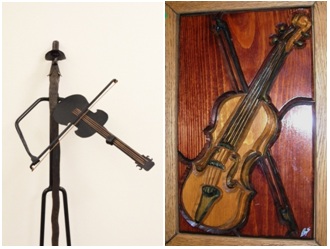 Because Byrd’s fiddling was so widely publicized, he received many gifts that commemorated his love for mountain music. The Byrd collection houses several handcrafted fiddle-themed gifts given to the senator that he kept in his home and offices. Byrd’s passion for mountain music really comes through in a 1964 “Byrd’s Eye View” article where he describes the importance of fiddle tunes in Appalachian culture by lovingly explaining that: “To a mountain music lover, a fiddling contest in his community is an event with more life than an Independence Day parade in any metropolis.”[2] Despite whatever issues faced Senator Byrd in his political life, his love for music and the fiddle always stayed constant. The fiddle was his way of personally connecting to the people of West Virginia and he maintained that connection for over 60 years. Robert C. Byrd left behind a long political legacy, but nearly as enduring is his musical legacy. Through gifts and awards, we can see that Byrd the Fiddler was almost as important to constituents as Byrd the Politician. Even after his passing in 2010, the fiddle continued to be recognized as a significant aspect of Senator Byrd’s life. Comments are closed.
|
Welcome to the Byrd Center Blog! We share content here including research from our archival collections, articles from our director, and information on upcoming events.
Categories
All
Archives
July 2023
|
Our Mission: |
The Byrd Center advances representative democracy by promoting a better understanding of the United States Congress and the Constitution through programs and research that engage citizens.
|
Copyright © Robert C. Byrd Center for Congressional History and Education
|

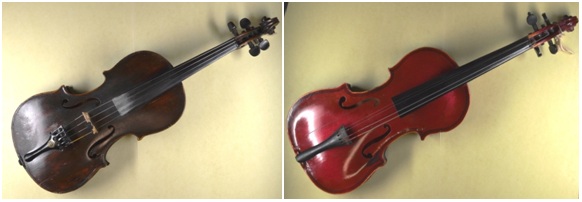
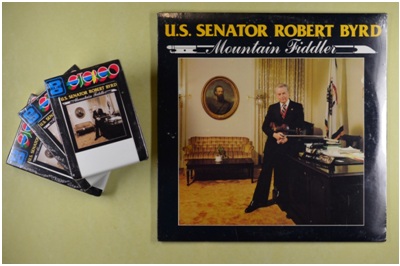
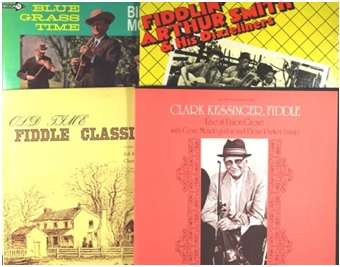
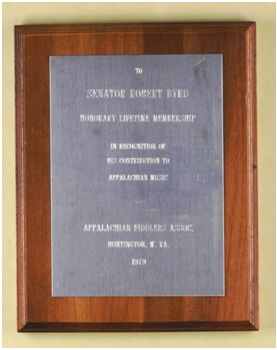
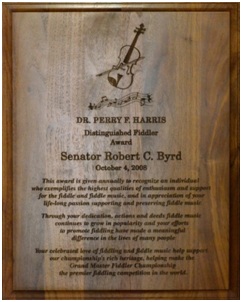
 RSS Feed
RSS Feed
